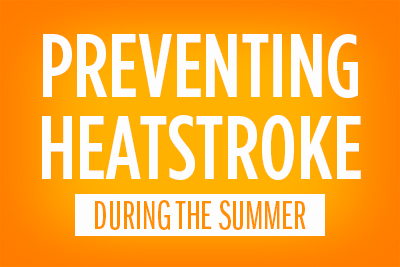
It can be very hot during summer months, and the National Institutes of Health (NIH) encourages older adults to take extra precautions this summer to avoid a heatstroke. A heatstroke can occur when your body has overheated, causing nausea and vomiting.
Below are a few factors, provided by the National Institute on Aging, that can increase your risk of a heatstroke:
- Age-related changes to the skin such as poor blood circulation
- Any heart, lung, kidney or any disease that causes weakness or fever
- High-blood pressure
Not only do medical conditions play a part at increasing your risk of a heatstroke, lifestyle factors such as living in hot quarters, lack of transportation, and even overdressing can increase your chances as well. Try to avoid being in the heat for too long as often as possible to protect yourself, and stay hydrated!
If you happen to encounter someone who you suspect is suffering from a heat stroke, please call 911 immediately and get the person out of the heat into a shady, cool place.

